Search titles
Displaying results 481 to 490 of 628.

Food and Agriculture in Papua New Guinea »
Edited by: R. Michael Bourke, Tracy Harwood
Publication date: August 2009
Agriculture dominates the rural economy of Papua New Guinea (PNG). More than five million rural dwellers (80% of the population) earn a living from subsistence agriculture and selling crops in domestic and international markets.
Many aspects of agriculture in PNG are described in this data-rich book. Topics include agricultural environments in which crops are grown; production of food crops, cash crops and animals; land use; soils; demography; migration; the macro-economic environment; gender issues; governance of agricultural institutions; and transport. The history of agriculture over the 50 000 years that PNG has been occupied by humans is summarised. Much of the information presented is not readily available within PNG. The book contains results of many new analyses, including a food budget for the entire nation. The text is supported by 165 tables and 215 maps and figures.

The Making of The Australian National University »
1946-1996
Authored by: Stephen Foster, Margaret Varghese
Publication date: August 2009
The Australian National University has always been a university with a difference. Conceived in the mid–1940s to serve Australia’s post-war needs for advanced research and postgraduate training, it quickly embraced the ideals and traditions of Oxford and Cambridge. Undergraduate teaching was introduced in 1960, following amalgamation with Canberra University College. The University continued to adapt to changes in Australian society, while retaining much of its unique structure and objectives.
Stephen Foster and Margaret Varghese trace the history of ANU from its wartime origins to its fiftieth anniversary in 1996, featuring many of the prominent Australians who contributed to its making: ‘Nugget’ Coombs, Howard Florey, Mark Oliphant, W.K. Hancock, Douglas Copland, John Crawford, Peter Karmel; and others who stood out in particular fields, such as J.C.Eccles, Arthur Birch, Manning Clark, Russell Mathews, Ernest Titterton, Beryl Rawson, John Mulvaney, John Passmore and Frank Fenner.
The Making of The Australian National University explores many themes in higher education during the last half century, including academic freedom, relations between universities and politicians, recruitment practices, the ‘two cultures’ of science and the humanities, collegial versus managerial structures, equality of opportunity, student politics, academics and architecture and universities in the marketplace.
This is an affectionate and critical account of a remarkable Australian institution; and, more broadly, a fascinating study of how institutions work.

Migration and Transnationalism »
Pacific Perspectives
Edited by: Helen Lee, Steve Tupai Francis
Publication date: August 2009
Pacific Islanders have engaged in transnational practices since their first settlement of the many islands in the region. As they moved beyond the Pacific and settled in nations such as New Zealand, the U.S. and Australia these practices intensified and over time have profoundly shaped both home and diasporic communities. This edited volume begins with a detailed account of this history and the key issues in Pacific migration and transnationalism today. The papers that follow present a range of case studies that maintain this focus on both historical and contemporary perspectives. Each of the contributors goes beyond a narrowly economic focus to present the human face of migration and transnationalism; exploring questions of cultural values and identity, transformations in kinship, intergenerational change and the impact on home communities.
Pacific migration and transnationalism are addressed in this volume in the context of increasing globalisation and growing concerns about the future social, political and economic security of the Pacific region. As the case studies presented here show, the future of the Pacific depends in many ways on the ties diasporic Islanders maintain with their homelands.

Research Integration Using Dialogue Methods »
Authored by: David McDonald, Gabriele Bammer, Peter Deane
Publication date: August 2009
Research on real-world problems—like restoration of wetlands, the needs of the elderly, effective disaster response and the future of the airline industry—requires expert knowledge from a range of disciplines, as well as from stakeholders affected by the problem and those in a position to do something about it. This book charts new territory in taking a systematic approach to research integration using dialogue methods to bring together multiple perspectives. It links specific dialogue methods to particular research integration tasks.
Fourteen dialogue methods for research integration are classified into two groups:
Dialogue methods for understanding a problem broadly: integrating judgements
Dialogue methods for understanding particular aspects of a problem: integrating visions, world views, interests and values.
The methods are illustrated by case studies from four research areas: the environment, public health, security and technological innovation.
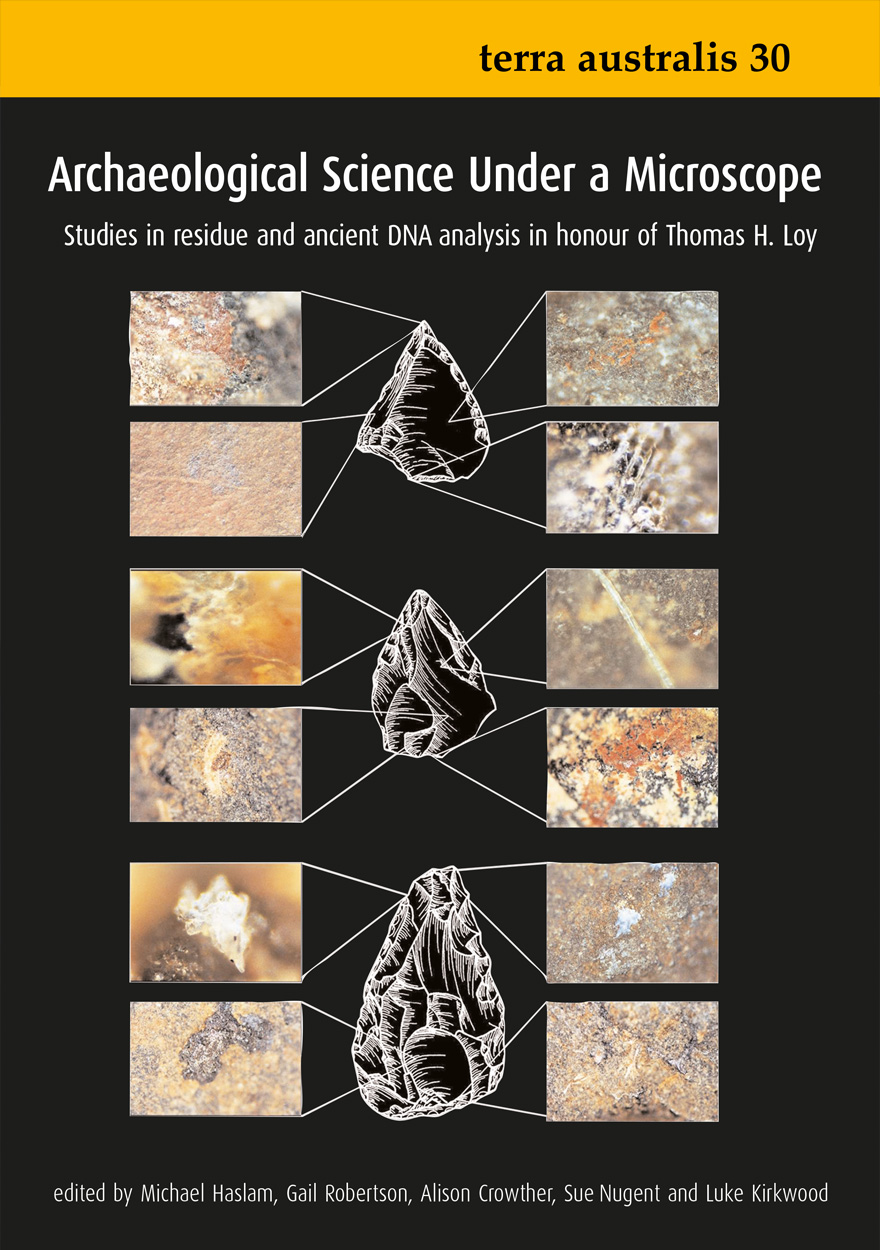
Archaeological Science Under a Microscope »
Studies in Residue and Ancient DNA Analysis in Honour of Thomas H. Loy
Edited by: Michael Haslam, Gail Robertson, Alison Crowther, Sue Nugent, Luke Kirkwood
Publication date: July 2009
These highly varied studies, spanning the world, demonstrate how much modern analyses of microscopic traces on artifacts are altering our perceptions of the past. Ranging from early humans to modern kings, from ancient Australian spears or Mayan pots to recent Maori cloaks, the contributions demonstrate how starches, raphides, hair, blood, feathers, resin and DNA have become essential elements in archaeology’s modern arsenal for reconstructing the daily, spiritual, and challenging aspects of ancient lives and for understanding human evolution. The book is a fitting tribute to Tom Loy, the pioneer of residue studies and gifted teacher who inspired and mentored these exciting projects.

Oceanic Encounters »
Exchange, Desire, Violence
Edited by: Margaret Jolly, Serge Tcherkézoff, Darrell Tryon
Publication date: July 2009
This volume, the result of ongoing collaborations between Australian and French anthropologists, historians and linguists, explores encounters between Pacific peoples and foreigners during the longue durée of European exploration, colonisation and settlement from the sixteenth century to the twentieth century. It deploys the concept of ‘encounter’ rather than the more common idea of ‘first contact’ for several reasons. Encounters with Europeans occurred in the context of extensive prior encounters and exchanges between Pacific peoples, manifest in the distribution of languages and objects and in patterns of human settlement and movement. The concept of encounter highlights the mutuality in such meetings of bodies and minds, whereby preconceptions from both sides were brought into confrontation, dialogue, mutual influence and ultimately mutual transformation. It stresses not so much prior visions of ‘strangers’ or ‘others’ but the contingencies in events of encounter and how senses other than vision were crucial in shaping reciprocal appraisals. But a stress on mutual meanings and interdependent agencies in such cross-cultural encounters should not occlude the tumultuous misunderstandings, political contests and extreme violence which also characterised Indigenous-European interactions over this period.
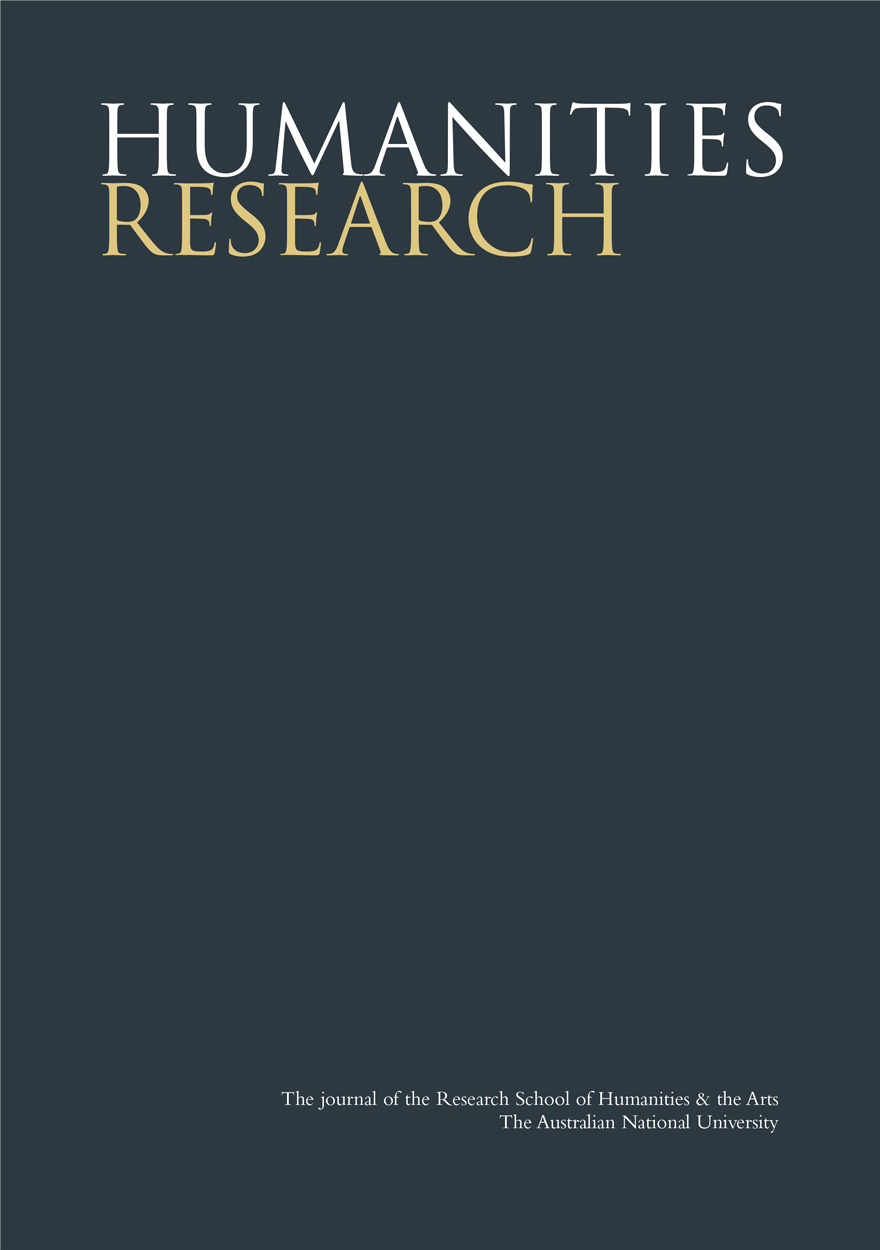
Humanities Research Journal Series: No. 1. 2000 »
Publication date: July 2009
Humanities Research is an internationally peer-reviewed journal published by the Research School of Humanities at The Australian National University. The Research School of Humanities came into existence in January 2007 and consists of the Humanities Research Centre, Centre for Cross-Cultural Research, National Europe Centre and Australian National Dictionary Centre. Launched in 1997, issues are thematic with guest editors and address important and timely topics across all branches of the humanities.
Download for free
Not available for purchase
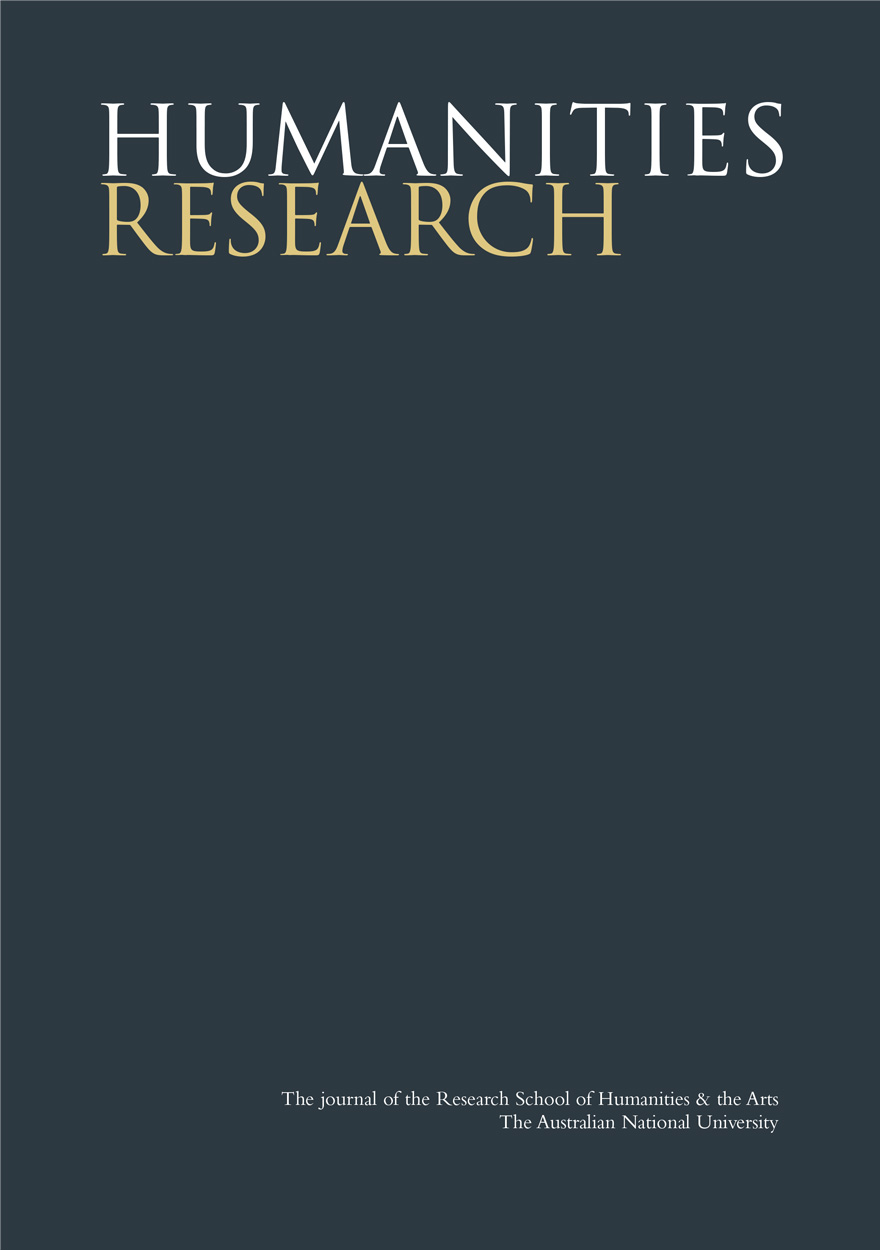
Humanities Research: No. 2. 1999 »
Publication date: July 2009
Humanities Research is an internationally peer-reviewed journal published by the Research School of Humanities at The Australian National University. The Research School of Humanities came into existence in January 2007 and consists of the Humanities Research Centre, Centre for Cross-Cultural Research, National Europe Centre and Australian National Dictionary Centre. Launched in 1997, issues are thematic with guest editors and address important and timely topics across all branches of the humanities.
Download for free
Not available for purchase
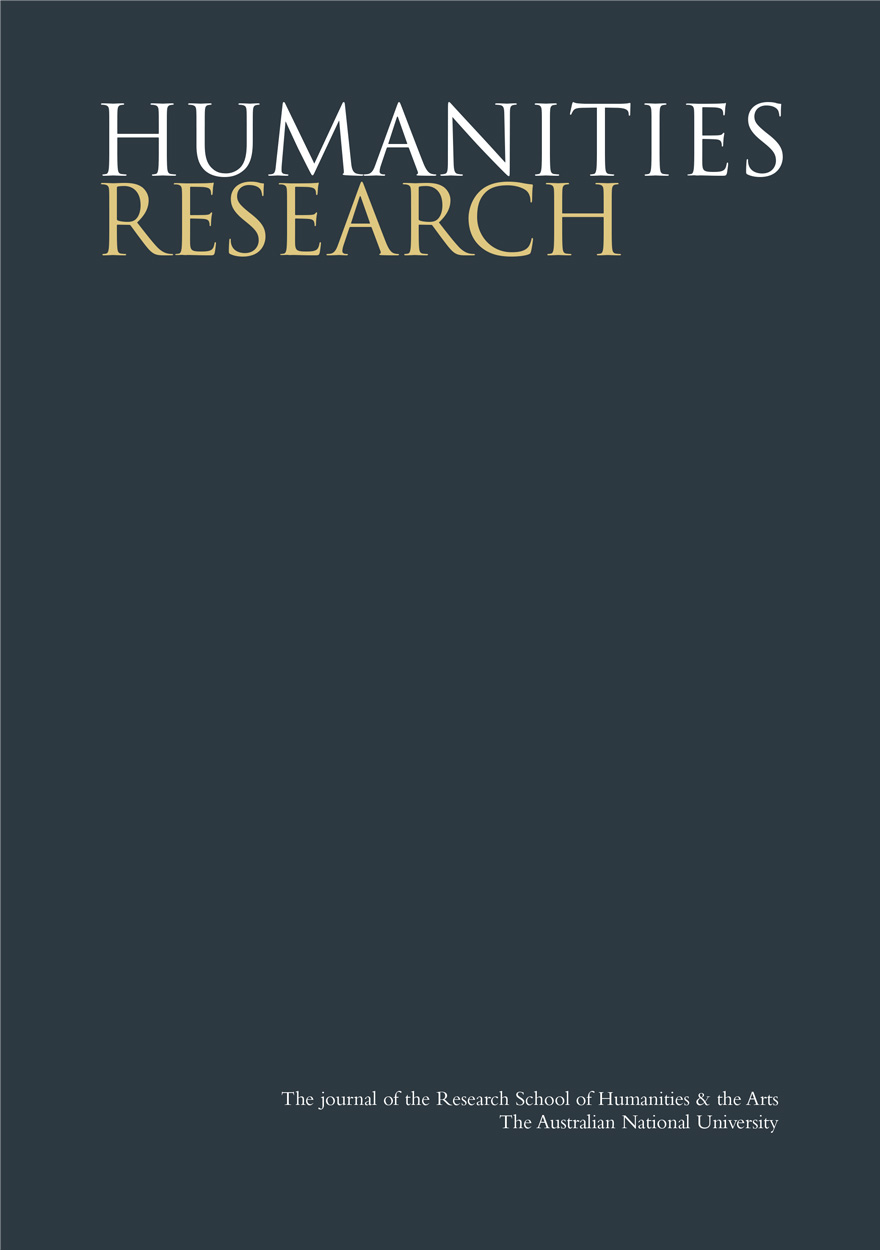
Humanities Research: No. 1. 1999 »
Publication date: July 2009
Humanities Research is an internationally peer-reviewed journal published by the Research School of Humanities at The Australian National University. The Research School of Humanities came into existence in January 2007 and consists of the Humanities Research Centre, Centre for Cross-Cultural Research, National Europe Centre and Australian National Dictionary Centre. Launched in 1997, issues are thematic with guest editors and address important and timely topics across all branches of the humanities.
Download for free
Not available for purchase
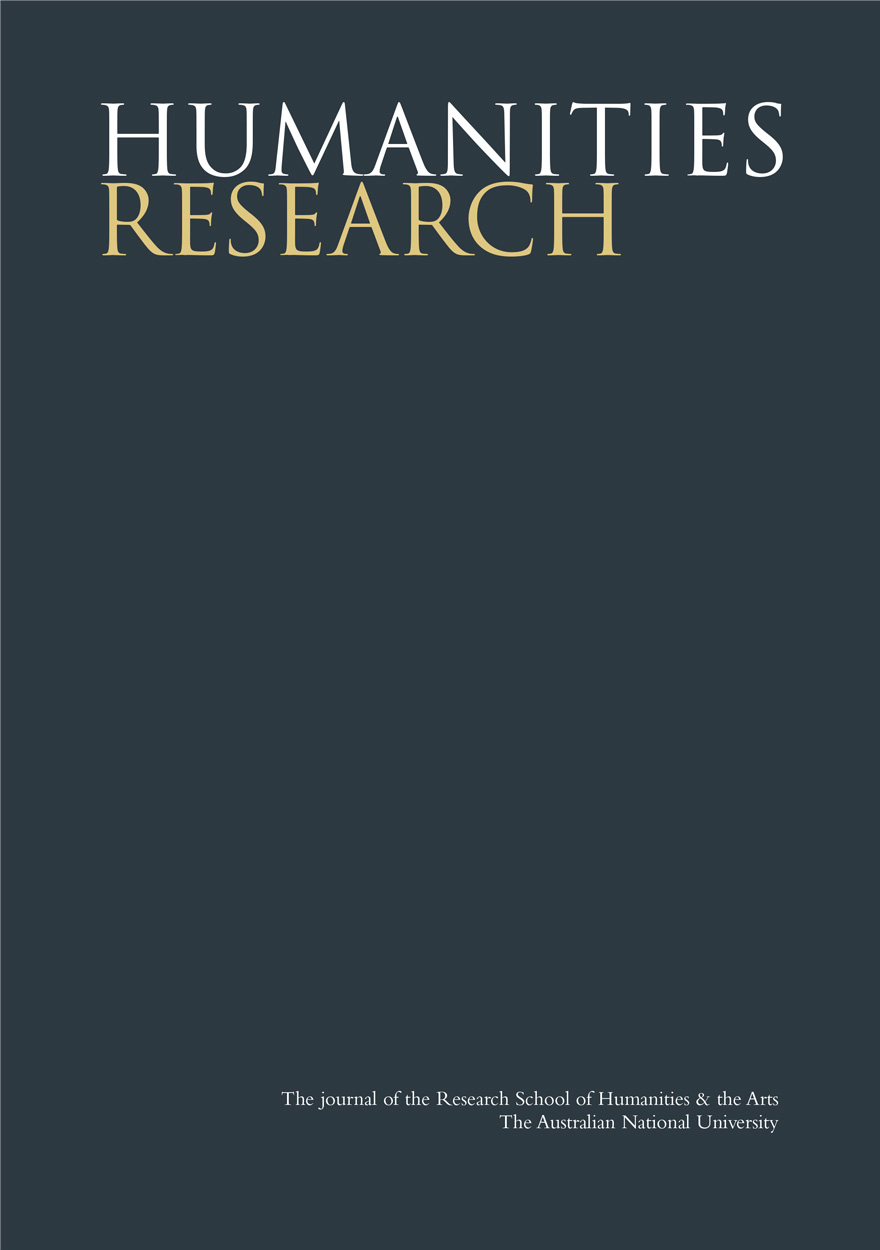
Humanities Research: No. 3. 1998 »
Publication date: July 2009
Humanities Research is an internationally peer-reviewed journal published by the Research School of Humanities at The Australian National University. The Research School of Humanities came into existence in January 2007 and consists of the Humanities Research Centre, Centre for Cross-Cultural Research, National Europe Centre and Australian National Dictionary Centre. Launched in 1997, issues are thematic with guest editors and address important and timely topics across all branches of the humanities.
Download for free
Not available for purchase



